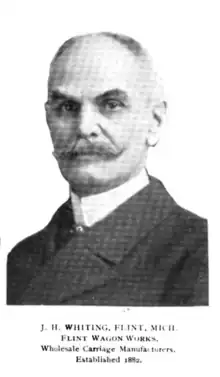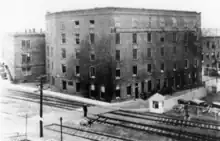James H. Whiting
James H. Whiting was an American industrialist and automobile pioneer. Without any engineering experience and a clear conception of the manufacture, sale, and marketing of automobiles, he produced and sold buggies, carts, and farm wagons.[1] He was a co-founder of Flint Wagon Works, which later became Chevrolet Flint Manufacturing. He was the competitor of William C. Durant in the manufacture of carriages.[2]
James H. Whiting | |
|---|---|
 James H. Whiting in 1904 | |
| Born | James H. Whiting Flint, Michigan, U.S. |
| Occupation | Business |
| Known for | Co-founder of Flint Wagon Works and Chevrolet |
Biography
Whiting first worked in the lumber industry. He operated the Whiting & Richardson Hardware Store. He then left the company to manage Begole, Fox and Company. It was a company partly owned by Josiah Begole and was engaged in the lumber business. This company was eventually transformed into Flint Wagon Works in 1882.[3] Whiting became its president in 1902.[4] He oversaw the company's production of wagons and carriages.[2]
Years later, Whiting became interested in the automobile business. He believed that due to his knowledge and experience in the manufacture of wagons and carriages, he would be capable of manufacturing automobiles.[2] He then purchased Benjamin and Frank Briscoe's interests in the Buick Manufacturing Company in the summer of 1903.[2][5] An account describes how Buick's son, Tom, drove one Buick car to Flint to prove to Whiting that the self-propelled vehicle worked and the latter was impressed.[6] Initially, Whiting was interested in manufacturing engines for stationary and marine use and also for the use in automobiles.[7] By 1904, he agreed to the production of an entire automobile.[7]

Whitings' two companies merged to form Buick Manufacturing Company and its facilities were moved to Flint from Buick's headquarters in Detroit.[2] Flint during this period was the center for the American wagon and carriage production due to its proximity to Michigan's extensive hardwood forests.[8] By 1903, the company was able to produce 3 automobiles.[2] Durant was asked to organize the Whiting Motor Car Company in 1903 as a Buick subsidiary. Whiting served as the president of this company, which was dissolved in 1907.[9]

After Whiting sold Flint Wagon Works to Durant, he resurrected the Whiting Motor Car Company in 1911.[3] This produced the Whiting car, which was manufactured at the Flint Wagon Works facility. This structure would become the site of Chevrolet's first manufacturing plants.[10]
In October 1967, a theater in the Flint Institute of Music was named in Whiting's honor.[4]
References
- Pound, Arthur (2013). The Turning Wheel - The story of General Motors through twenty-five years 1908-1933. Edizioni Savine. ISBN 978-88-96365-39-7.
- Kollins, Michael J. (2002). The Big Three. Warrendale, PA: SAE International. p. 84. ISBN 0-7680-0904-9.
- Gustin, Lawrence R. (2011). Billy Durant: Creator of General Motors. Ann Arbor, Michigan: University of Michigan Press. p. 54. ISBN 978-0-472-03302-7.
- "Flint Cultural Center - The Whiting". flintcultural.org. Retrieved 2023-08-30.
- Mroz, Albert (2010). American Cars, Trucks and Motorcycles of World War I: Illustrated Histories of 225 Manufacturers. Jefferson, NC: McFarland. p. 40. ISBN 978-0-7864-3967-6.
- Kollins, Michael J. (2002). The Design Innovators. Warrendale, PA: SAE International. p. 176. ISBN 0-7680-0904-9.
- Fourie, Louis F. (2016). On a Global Mission: The Automobiles of General Motors International Volume 3: GM Worldwide Review, North American Specifications and Executive Listings, Volume 3. Victoria, B.C.: FriesenPress. p. 1087. ISBN 978-1-4602-9690-5.
- Rubenstein, James M. (2002). The Changing U.S. Auto Industry: A Geographical Analysis. New York, NY: Routledge. p. 33. ISBN 0-415-05544-X.
- Gustin, Lawrence R. (2008). Billy Durant: Creator of General Motors. Ann Arbor, MI: University of Michigan Press. p. 78. ISBN 978-0-472-03302-7.
- Davis, Michael W. R. (2012). Chevrolet: 1911-1960. Arcadia Publishing. p. 11. ISBN 978-0-7385-9394-4.